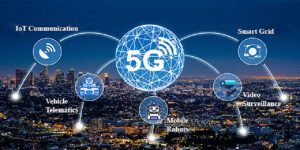Healthcare, smart city services to grow 5G IoT connections to 116m globally by 2026
January 25, 2023656 views0 comments
By Onome Amuge
5G IoT (Internet of Things) connections has been projected to hit 116 million globally by 2026, rising from just 17 million in 2023. The 1,100 per cent growth is expected to be underpinned by the improvements in the healthcare sector and smart city services, according to a new study from Juniper Research.
The digital market research, forecasting & consultancy firm in its examination of 5G adoption across key sectors, such as the automotive industry, mobile broadband and smart homes, noted that the healthcare and smart cities market will account for over 60 per cent of 5G IoT devices by 2026.
Juniper further pointed out that the ultra-low latency and high bandwidth of 5G IoT technology will be the key factors in driving the proliferation of new connections.
In its assessment of the impact of 5G IoT on smart cities, the report anticipates that 5G networks will experience significant growth in smart city services, owing to its cost-effectiveness in deployment and ability to carry significant amounts of data.
 The report projected that by 2026, there will be over 60 million 5G smart city connections globally. It also found that the monitoring of transportation networks, including road and rail networks, will be key services that require 5G-enabled high-bandwidth cellular connectivity.
The report projected that by 2026, there will be over 60 million 5G smart city connections globally. It also found that the monitoring of transportation networks, including road and rail networks, will be key services that require 5G-enabled high-bandwidth cellular connectivity.
Based on this, city-planning authorities were encouraged to leverage 5G connectivity as high-bandwidth gateways.
Analysing how digital transformation in healthcare drives 5G adoption, the report said investment from healthcare providers into 5G-based services will be driven by the need to modernise services, considering that the global COVID-19 pandemic exposed inefficiencies in healthcare provision.
The report identified services including telemedicine, connected ambulances and emergency services, and real‑time remote monitoring as key services that will be immediately improved by the integration of 5G services.
Olivia Williams,the research co-author, remarked that 5G will enable more efficient and dynamic healthcare provision that was not feasible with 4G or Wi-Fi.
Williams, however, advised that healthcare providers must first implement 5G in areas which provide a strong return on investment, most notably connected emergency services.
